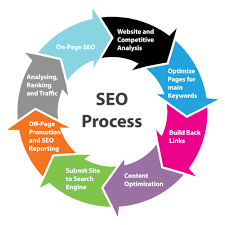Search Engine Marketing Analysis: A Comprehensive Guide
In the digital age, search engine marketing (SEM) has become a crucial component of any successful online marketing strategy. By leveraging search engines like Google, businesses can reach their target audience effectively. However, to maximise the impact of SEM campaigns, it is essential to conduct thorough analysis and optimisation.
The Importance of SEM Analysis
SEM analysis involves evaluating the performance of your paid search campaigns to identify strengths, weaknesses, and opportunities for improvement. By analysing key metrics such as click-through rates, conversion rates, and cost per click, you can gain valuable insights into the effectiveness of your SEM efforts.
Key Steps in SEM Analysis
- Keyword Performance: Analyse the performance of your chosen keywords to determine which ones are driving the most traffic and conversions.
- Ad Copy Effectiveness: Evaluate the effectiveness of your ad copy by assessing click-through rates and conversion rates for each ad variation.
- Landing Page Analysis: Examine the performance of your landing pages to ensure they are optimised for conversions and provide a seamless user experience.
- Budget Allocation: Review your budget allocation across different campaigns to ensure optimal spending and maximum ROI.
- Competitor Analysis: Monitor competitor activity and performance to identify opportunities for improvement and stay ahead in the competitive landscape.
The Role of Data in SEM Analysis
Data plays a central role in SEM analysis. By collecting and analysing data from various sources such as Google Analytics and AdWords, you can make informed decisions about campaign optimisation. Utilising tools like Google Tag Manager can help streamline data collection processes and provide deeper insights into user behaviour.
Conclusion
In conclusion, search engine marketing analysis is essential for maximising the effectiveness of your SEM campaigns. By conducting regular analysis, identifying areas for improvement, and leveraging data-driven insights, you can enhance your online visibility, drive targeted traffic, and achieve your marketing goals with precision.
Comprehensive Guide to Frequently Asked Questions on Search Engine Marketing (SEM) Analysis
- What is search engine marketing with example?
- What is an SEM strategy?
- What are the main methods of search engine marketing?
- How do search engines analyze marketing?
- What is SEM marketing and how it works?
- How to do search engine marketing analysis?
- What is the purpose of SEM marketing?
- What does SEM mean in marketing?
- What is SEM vs SEO?
- What is search engine marketing good for?
- What are the 3 main search engine marketing products?
- What is SEM strategy?
- What is the role of search engine in marketing?
- What is search engine in marketing?
- What type of marketing is search engine marketing?
- How SEM marketing works?
- What is the search engine theory of marketing?
- What is the objective of SEM?
- What is search engines in marketing?
What is search engine marketing with example?
Search engine marketing (SEM) is a digital marketing strategy that involves promoting websites by increasing their visibility in search engine results pages through paid advertising. An example of SEM is running Google Ads campaigns, where businesses bid on keywords related to their products or services to have their ads displayed at the top of search results. When a user searches for a relevant keyword and clicks on the ad, the advertiser pays a fee to the search engine. SEM allows businesses to target specific audiences, increase brand awareness, drive website traffic, and ultimately generate leads or sales through strategic online advertising efforts.
What is an SEM strategy?
An SEM strategy, short for Search Engine Marketing strategy, refers to a comprehensive plan of action designed to enhance a company’s online visibility and drive targeted traffic through paid search advertising. It involves selecting relevant keywords, creating compelling ad copy, setting budget allocations, and monitoring campaign performance to achieve specific marketing objectives. A well-crafted SEM strategy aims to maximise ROI by optimising ad placements, refining targeting parameters, and continuously analysing data to improve campaign effectiveness. In essence, an effective SEM strategy is instrumental in boosting brand awareness, increasing website traffic, and ultimately driving conversions in the competitive digital landscape.
What are the main methods of search engine marketing?
When it comes to search engine marketing, there are several main methods that businesses can utilise to enhance their online presence and reach their target audience effectively. The primary methods of search engine marketing include Search Engine Optimization (SEO), which involves optimising website content and structure to improve organic search rankings; Pay-Per-Click (PPC) advertising, where businesses bid on keywords to display ads on search engine results pages; and Local Search Marketing, which focuses on promoting a business’s products or services to local customers. Each method offers unique benefits and can be tailored to suit specific marketing objectives, making them essential components of a comprehensive search engine marketing strategy.
How do search engines analyze marketing?
Search engines analyse marketing through a variety of algorithms and metrics to determine the relevance and quality of marketing content. They assess factors such as keyword relevance, ad quality, user engagement, and overall website performance to rank and display search results effectively. By evaluating these key elements, search engines can deliver the most relevant and valuable information to users based on their search queries. Additionally, search engines may also consider external factors like backlinks and social signals to further refine their analysis of marketing content across the web.
What is SEM marketing and how it works?
Search Engine Marketing (SEM) is a digital marketing strategy that involves promoting websites by increasing their visibility in search engine results pages through paid advertising. SEM works by allowing businesses to bid on specific keywords that users might enter into search engines like Google. When a user searches for a keyword that matches the bid terms, the ad is displayed prominently in the search results, driving targeted traffic to the website. SEM also includes other tactics such as pay-per-click (PPC) advertising and remarketing to engage with potential customers effectively. By strategically managing SEM campaigns, businesses can increase brand awareness, drive website traffic, and generate leads or sales efficiently in the competitive online landscape.
How to do search engine marketing analysis?
Understanding how to conduct search engine marketing analysis is essential for maximising the effectiveness of your online marketing efforts. To begin, start by collecting data on key metrics such as click-through rates, conversion rates, and cost per click. Analyse the performance of your chosen keywords, evaluate the effectiveness of your ad copy, and assess the performance of your landing pages. Utilise tools like Google Analytics and AdWords to gather insights into user behaviour and campaign performance. By regularly reviewing and optimising your SEM campaigns based on data-driven analysis, you can refine your strategies, improve ROI, and achieve better results in reaching your target audience effectively.
What is the purpose of SEM marketing?
The purpose of SEM marketing is to increase a business’s online visibility and reach its target audience effectively through paid search advertising. By utilising search engines like Google, businesses can promote their products or services to users who are actively searching for relevant keywords. SEM marketing aims to drive quality traffic to a website, generate leads, boost conversions, and ultimately enhance the overall return on investment (ROI) for the business. Through strategic keyword targeting, compelling ad copy, and continuous analysis and optimisation, SEM marketing enables businesses to achieve their marketing objectives efficiently in the competitive digital landscape.
What does SEM mean in marketing?
In the realm of marketing, SEM stands for Search Engine Marketing. This term encompasses a range of strategies and techniques used to increase a website’s visibility on search engine results pages through paid advertising. SEM involves activities such as pay-per-click (PPC) advertising, keyword research, and ad copy optimisation to drive targeted traffic to a website. By utilising SEM effectively, businesses can enhance their online presence, attract potential customers actively searching for relevant products or services, and ultimately boost their conversion rates.
What is SEM vs SEO?
In the realm of digital marketing, a common question that often arises is the distinction between SEM (Search Engine Marketing) and SEO (Search Engine Optimisation). While both SEM and SEO are strategies aimed at improving a website’s visibility on search engine results pages, they differ in their approaches. SEO focuses on organic methods to enhance a website’s ranking through content optimisation, keyword research, and backlink building. On the other hand, SEM involves paid advertising strategies like Google Ads to increase visibility through sponsored listings. Understanding the nuances between SEM and SEO is crucial for businesses looking to develop a comprehensive search engine marketing strategy that combines both organic and paid tactics effectively.
What is search engine marketing good for?
Search engine marketing (SEM) is highly beneficial for businesses looking to enhance their online visibility, attract targeted traffic, and drive conversions effectively. By utilising SEM strategies such as pay-per-click (PPC) advertising and search engine optimisation (SEO), companies can increase their brand awareness, reach potential customers at the right moment, and achieve measurable results. SEM allows businesses to target specific demographics, locations, and interests, ensuring that their marketing efforts are highly targeted and cost-effective. Overall, search engine marketing is a powerful tool for boosting website traffic, generating leads, and ultimately improving the overall success of a digital marketing campaign.
What are the 3 main search engine marketing products?
When it comes to search engine marketing (SEM) products, there are three main categories that businesses commonly utilise to enhance their online presence and reach their target audience effectively. The first product is Search Engine Advertising, which involves creating and running paid ads on search engines like Google to increase visibility and drive traffic to websites. The second product is Search Engine Optimisation (SEO), which focuses on improving a website’s organic search ranking through strategic keyword optimisation, content creation, and technical enhancements. Lastly, the third product is Pay-Per-Click (PPC) advertising, where advertisers pay a fee each time their ad is clicked, offering a cost-effective way to drive immediate traffic and conversions. These three SEM products work in tandem to help businesses achieve their marketing objectives and maximise their online visibility.
What is SEM strategy?
In the realm of search engine marketing analysis, the concept of SEM strategy holds significant importance. An SEM strategy refers to a comprehensive plan of action designed to enhance a brand’s online visibility and drive targeted traffic through paid search campaigns. It involves selecting the right keywords, crafting compelling ad copy, setting budget allocations, and continuously analysing and optimising campaign performance. A well-defined SEM strategy aims to maximise return on investment (ROI) by reaching the right audience at the right time with relevant and engaging content. By aligning business objectives with SEM tactics, companies can effectively boost their online presence and achieve their marketing goals in a competitive digital landscape.
What is the role of search engine in marketing?
The role of search engines in marketing is pivotal in today’s digital landscape. Search engines serve as the primary gateway through which businesses can connect with their target audience online. By leveraging search engine marketing strategies, companies can enhance their visibility, reach a larger audience, and drive relevant traffic to their websites. Search engines play a crucial role in facilitating consumer discovery, enabling businesses to showcase their products or services to users actively seeking relevant information. Through effective search engine marketing analysis, organisations can refine their strategies, optimise their online presence, and ultimately achieve their marketing objectives by harnessing the power of search engines as key drivers of brand awareness and customer engagement.
What is search engine in marketing?
Search engine marketing (SEM) is a powerful digital marketing strategy that involves promoting websites by increasing their visibility in search engine results pages (SERPs) through paid advertising. Search engines like Google, Bing, and Yahoo allow businesses to display ads that appear alongside organic search results when users enter relevant keywords. SEM encompasses various techniques such as pay-per-click (PPC) advertising, where advertisers bid on keywords to have their ads displayed to a target audience. By utilising SEM effectively, businesses can drive targeted traffic to their websites, increase brand awareness, and generate leads or sales.
What type of marketing is search engine marketing?
Search engine marketing (SEM) is a form of digital marketing that specifically focuses on promoting websites by increasing their visibility in search engine results pages through paid advertising. SEM involves techniques such as pay-per-click (PPC) advertising and search engine optimisation (SEO) to drive targeted traffic to websites. By targeting relevant keywords and creating compelling ad copy, businesses can effectively reach their audience when they are actively searching for products or services related to their offerings. SEM is a highly targeted and measurable form of marketing that allows businesses to reach potential customers at the moment they are most likely to convert.
How SEM marketing works?
Search engine marketing (SEM) works by enabling businesses to promote their products or services through paid advertising on search engine results pages. When a user enters a relevant search query, SEM allows advertisers to bid on specific keywords to display their ads prominently. The ad placement is determined by factors such as bid amount, ad quality, and relevance to the search query. When a user clicks on the ad, the advertiser incurs a cost based on the pay-per-click (PPC) model. SEM campaigns can be highly targeted, allowing businesses to reach their desired audience effectively and measure the performance of their ads through key metrics like click-through rates and conversions. By analysing these metrics and continuously refining their strategies, businesses can optimise their SEM efforts for maximum impact and return on investment.
What is the search engine theory of marketing?
The search engine theory of marketing is based on the premise that search engines play a pivotal role in connecting businesses with their target audience online. This theory emphasises the importance of leveraging search engine platforms, such as Google and Bing, to increase brand visibility, drive website traffic, and generate leads. By understanding how search engines rank and display results, marketers can optimise their strategies to improve organic search rankings and enhance paid search campaigns. The search engine theory of marketing highlights the significance of keyword research, content optimisation, and data analysis in achieving success in the competitive digital landscape.
What is the objective of SEM?
The primary objective of Search Engine Marketing (SEM) is to increase a website’s visibility and drive targeted traffic through paid search advertising. By strategically placing ads on search engine results pages, businesses aim to attract potential customers who are actively searching for products or services related to their offerings. SEM helps companies reach their target audience effectively, increase brand awareness, generate leads, and ultimately boost conversions. Additionally, SEM allows businesses to track and measure the performance of their campaigns in real-time, enabling them to make data-driven decisions for continuous improvement and optimal results.
What is search engines in marketing?
Search engines play a pivotal role in marketing by serving as powerful tools for connecting businesses with their target audience online. In the realm of search engine marketing, search engines act as gateways through which businesses can promote their products or services to potential customers actively seeking relevant information. By utilising search engine marketing strategies, businesses can enhance their visibility on search engine results pages, drive targeted traffic to their websites, and ultimately increase conversions. Understanding the dynamics of search engines in marketing is crucial for crafting effective SEM campaigns that resonate with users and yield tangible results in the competitive digital landscape.




